Connectivity Testing of Smart Devices
In today’s fast-paced technological landscape, smart devices have become indispensable in our daily lives. These devices, ranging from wearables to home appliances and beyond, rely heavily on their connectivity capabilities to function seamlessly. Ensuring the robustness and reliability of these connections is crucial not only for consumer satisfaction but also for compliance with international standards.
Connectivity testing involves a comprehensive evaluation of smart devices to ensure that they meet specific performance criteria related to wireless communication protocols such as Bluetooth, Wi-Fi, Zigbee, and others. This service ensures the smooth operation of these devices within their intended environments, whether in a home setting or a commercial environment.
The process begins with an in-depth understanding of the device’s specifications and its intended use cases. This information helps tailor the test parameters to the specific requirements of the product. The testing apparatus includes a variety of state-of-the-art equipment designed to simulate real-world conditions, such as electromagnetic interference (EMI), signal strength variations, and network congestion.
During the test, we subject the smart device to a series of stress tests that mimic typical user scenarios. This includes evaluating the device’s ability to maintain a connection under varying environmental conditions, such as changing signal strengths, background noise, and interference from other devices. The goal is to identify any potential issues early on so that they can be addressed before the product reaches the market.
The results of these tests are meticulously recorded and analyzed using advanced software tools that provide detailed insights into the device’s performance. These reports serve as a critical tool for quality managers, compliance officers, R&D engineers, and procurement teams to make informed decisions about product design improvements and potential regulatory challenges.
By leveraging our expertise in connectivity testing, clients can ensure that their smart devices meet the highest standards of reliability and performance. This not only enhances consumer trust but also helps in maintaining a competitive edge in the market. Our commitment to precision and thoroughness ensures that every device undergoes rigorous evaluation to deliver optimal results.
Applied Standards
| Standard | Description |
|---|---|
| ISO/IEC 17025:2017 | Ensures that laboratories providing testing services are competent to do so. |
| IEEE 802.11 (Wi-Fi) | Defines the specifications for wireless local area networks using Wi-Fi technology. |
| Bluetooth SIG Specifications | Establishes the technical standards and protocols for Bluetooth wireless technology. |
| Zigbee Alliance Standards | Provides a set of standards for low-power, high-reliability personal area networks (PANs). |
Why Choose This Test
The importance of connectivity testing cannot be overstated in the realm of consumer products and electronics. By choosing this test, organizations can ensure that their smart devices are not only technologically advanced but also reliable and user-friendly. This is particularly crucial for companies operating in sectors like healthcare, home automation, and wearable technology.
One of the key reasons to opt for connectivity testing is the ability to identify potential issues early in the product lifecycle. This proactive approach helps manufacturers avoid costly recalls and reputational damage that can arise from malfunctioning devices. The test also ensures compliance with international standards, thereby facilitating easier market access and regulatory approval.
Furthermore, by investing in rigorous connectivity testing, companies can enhance their brand reputation and customer trust. Consumers are increasingly wary of products that fail to meet expectations or pose a risk due to poor design or manufacturing flaws. By demonstrating a commitment to quality through thorough testing, manufacturers can build a loyal customer base.
The test also provides valuable insights into the performance characteristics of smart devices under different conditions. This data is invaluable for R&D teams as they work towards enhancing product features and capabilities. It allows them to refine their design choices and optimize performance parameters without compromising on safety or functionality.
Lastly, connectivity testing offers a competitive edge in an increasingly crowded market. In today’s hyper-competitive environment, every advantage counts. By ensuring that your smart devices meet the highest standards of reliability and performance, you position yourself as a leader in your industry.
Competitive Advantage and Market Impact
The competitive landscape for consumer electronics is fierce, with new products entering the market almost daily. To stand out in this environment, companies must continuously innovate and improve their offerings. Connectivity testing plays a pivotal role in achieving this goal by providing actionable insights that can drive product development.
By identifying potential issues early on, connectivity testing allows manufacturers to make necessary adjustments before products reach the market. This not only reduces the risk of product failures but also enhances overall quality and customer satisfaction. As a result, companies that invest in this service gain a significant competitive advantage over their peers.
The data generated from these tests can be used to inform marketing strategies, enabling companies to highlight the reliability and performance features of their products effectively. This can lead to increased sales and market share, ultimately contributing to sustained growth and profitability.
Moreover, compliance with international standards is crucial for market access in many countries. By ensuring that smart devices meet these requirements through rigorous testing, companies can facilitate smoother entry into new markets while avoiding costly delays or rejections. This can significantly impact a company’s global expansion plans and overall business strategy.





